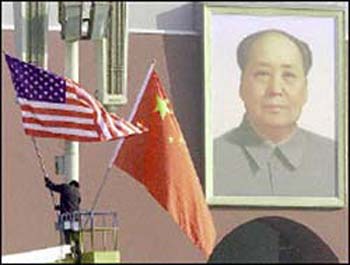 |
International Affairs
Financing Our Own Destruction
Toby Westerman
The United States appears to have a determined policy of self-destruction, a policy pursued by elements in business, government, and the intelligence community. The result of this policy, if left unchecked, will be the end of the United States as we now know it.
The growing military, political, and economic power of Communist China is familiar to regular readers of International News Analysis, the in-depth print report, and INA Today. Because of U.S. investment in China and consumer purchases of Chinese products, China is becoming a military and economic rival to the U.S.
Few news reports have informed the public that China could be a potential threat to the U.S., and no major broadcast media gave any warning to the public until Chinese business interests [connected to the Peoples Liberation Army (PLA)] made a bid for two prominent U.S. corporations, UNOCAL and Maytag.
Official U.S. government policy has encouraged strong economic ties with China in hopes of building free market structures and, eventually, a democratic government. A pro-China element in the U.S. intelligence community, recently documented in an article by Bill Gertz in the Washington Times, has enthusiastically supported this approach, and at the same time consistently underreported China's military growth.
Instead of a democratic movement burgeoning in China, the reality is that a Communist military colossus is growing, supported by a powerful economic machine, controlled in large part by the PLA. China will soon be able to project its will throughout the Asia-Pacific region, overwhelm the democratically ruled island of Taiwan, threaten the Philippines and Japan, and even insert a military presence in the Persian Gulf.

Raising the US flag in Tiananmen Square - a pretense "friendship" under the gaze of Mao Tsetung |
Chinese defectors state that China is already in an aggressive espionage war with Western nations. Former Beijing University professor Yuan Hongbing declared that Beijing is seeking to make Australia a "political colony of China," according to an AFP report. The Communist Party of China "will use their ideology to influence Australia's politics" and gradually force Australia "to betray its fundamental principles of freedom and democracy," Yuan stated.
Two other defectors, both Chinese diplomats, have stated that China has a network of more that 1,000 spies in Canada, according to the Canadian Broadcasting Service. U.S. officials have expressed concern over 3,000 "front corporations" operating in the service of Chinese intelligence service on American soil.
If American military lives are lost at the hands of a technically sophisticated, aggressive Chinese armed force, much of the blame for American deaths will fall upon the business interests who sent U.S. investment and jobs to China. These shortsighted U.S. business interests helped to build the economy which is financing the modernization of the Chinese military.
Bucking the broadcast blackout on negative news regarding China, CNN's Lou Dobbs did condemn U.S. corporate assistance to Communist China's suppression of the Chinese people in a segment titled, "Dot.commies."
Unfortunately the U.S. is making the same mistake in policy toward the Communist government of Vietnam as it did toward China. In an attempt to play power politics, the Bush administration is seeking to balance China's growing power with U.S. friendship and economic assistance to Vietnam.
The idea put forth is that Vietnam has interests at odds with those of China. Over the centuries China and Vietnam have had tense, and sometimes hostile, relations. The U.S. wants to build up Vietnam as a counterbalance to China - a force we helped create in the first place.
During the June 21st White House visit of Phan Van Khai, Prime Minister of Vietnam, U.S. President Bush and his administration expressed determination for close relations with Vietnam, and announced measures leading to significant economic and military ties.
Unfortunately, this approach is not based in reality. Not mentioned by any media or government official was Vietnam's renewed alliance with China, and Hanoi's support for anti-American, pro-Communist youth groups.
Eight months before Bush's meeting with Khai, China's official Xinhua news agency reported that relations between China and Vietnam were developing "rapidly, comprehensively and profoundly."
A joint communique issued by Chinese Premier Wen Jiabao and Khai stated that China and Vietnam were strengthening "political mutual trust," increasing "economic and trade cooperation," and establishing "positive progress in the resolution of problems left over by history."
Xinhua estimated that trade between China and Vietnam will reach 10 billion dollars by 2010.
And Vietnam is engaged in anti-American politics.
In February 2005, Hanoi hosted a preparatory meeting of communist youth organizations from around the world. The Hanoi meeting set the agenda for the "16th World Festival of Youth and Students," which will be held August 2005 in the now Marxist-dominated nation of Venezuela.
Recalling the most vehement moments of the Cold War, the theme of the "Festival" is: "For peace and solidarity, we fight imperialism and war." Among the expected 15,000 "youth" will be some 300 representatives from the U.S.
The reality is that Vietnam is a close ally of China, Hanoi remains committed to Communism, and that the U.S. is again arming a potential enemy.

Posted June 29, 2005
Toby Westerman publishes
International News Analysis - Today
An investigative and uncompromising weekly analysis of the world situation
Contact T. Westerman at
www.inatoday.com
or P.O. BOX 5182, Rockford, ILL, 61125-0182
|
International Affairs | Hot Topics | Home | Books | CDs | Search | Contact Us | Donate

© 2002- Tradition in Action, Inc. All Rights
Reserved
|
 |
|